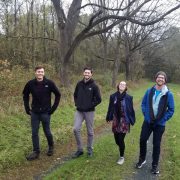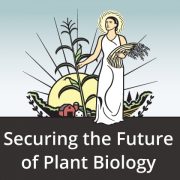From whole plant physiology to food security: a career journey
Guest post by Melissa D. Ho – Vice President, Freshwater, World Wildlife Fund-US
When Rob asked me to write something on security, I must admit I had a blank page for a couple of weeks. I decided to offer a perspective that is familiar to me and see if I could translate this to something relevant to this broader audience. I hope that you find the perspectives and questions useful.
My 20+ year career as a plant biologist has focused primarily on global food security and nutrition. “Security” in this context is about enabling strategies and innovations to ensure that the most basic of human needs – adequate food and nutrition – are met for the world’s poorest and most vulnerable people. Security also implies long-term sustainability, and the ability to adapt and be resilient to a changing environment and extreme events. In my experience, achieving lasting food security for an individual, household, community or nation requires consideration of some basic elements:
- Create and value new opportunities that diversify benefit streams and risk – Agricultural development professionals often aim to have subsistence farmers diversify their production systems, especially into non-staple crops like fruits, vegetables, spices, etc. so that they may benefit from the higher value and more nutritious commodities.
- Ensure access and uptake of dynamic and relevant information and training/capacity-building opportunities to be able to take advantage of new opportunities as they arise – Subsistence farmers can only successfully cultivate new commodities if they have the relevant background and knowledge of new cropping systems, access to productive inputs, and the training and capacity not only for the technical aspects of new cropping systems but also the socioeconomic factors that enable their success.
- Sustain proactive linkages to markets to better understand the potential implications and impacts of varied opportunities now and in the future. It is imperative that farmers understand the market dynamics for their commodity and heed market signals that tell them the value of their product, or else they may be stuck with lots of goods that nobody wants or demands.
These elements should not be considered as distinct and linear objectives, but rather are interconnected and can positively (or negatively) feedback on themselves to create a virtuous of vicious cycle for a farmer. These are themes that could be extrapolated to other security contexts and are worthy of some reflection beyond food and nutrition. How might they apply to you?
I was trained as a soil-plant-water relations, whole plant ecophysiologist. I have been incredibly lucky to have had a diverse and engaging career to date in research, policy, strategy, programs and operations related to agriculture development and nutrition, agricultural water management, value chains, and energy. I have mostly worked on the public or private donor side of the equation, but I now find myself at a conservation non-government organization (NGO) working on freshwater, agriculture, and nutrition-related issues. The funny thing is that ever since I was 12, I thought for sure I was going to be a litigator. One of my biggest fears was that I would be bored in my life, and trial law seemed like it would be a career path that would stay fresh and interesting for me. My concept of “job security” at that time was simply to stay motivated and find my passion. By the time I went to Cornell for my undergrad, my interests shifted to environmental issues and then almost simultaneously to international agricultural development, which for me is the intersection between people and place, science and society, culture and cuisine – all of which remain driving themes for my personal and professional interests. How do you define what job security means to you, and why? Is it merely having a job, or is it something more?
Throughout my career, I have sought out diverse experiences and opportunities. These often were a stretch for me, and this really paid off. As an undergraduate, I had the good fortune to have worked in a molecular biology lab of one of the hottest up-and-coming young scientists at the time studying the Tryptophan biosynthetic pathway (and who just happens to be the current President of ASPB). I was a “work-study” student and needed to get a job anyway to pay the bills. Washing glassware, making media, doing growth experiments with mutant Arabidopsis, and just being exposed to a well-run, high-performing plant molecular biology lab was one of the most formative experiences I had during those years. I was far from a model student and it was unlikely I would ever go into a basic research science career. Yet, I wanted to be there to learn, and Rob and the lab took a huge chance on me, which I have always appreciated. Cornell was a fantastic place to create flexibility in one’s degree. I was in an Agriculture and Biological Engineering Department, and yet my degree requirements still created space for courses in tropical soils, plant pathology, forest ecology, international agricultural development, irrigation design, agroecology, GIS, and post-harvest food loss. As a freshman, I wrote a term paper on the successes and shortcomings of the Green Revolution, and throughout my four years had the privilege of interacting directly with professional colleagues from South Asia, South America, and sub-Saharan Africa, many of whom were my classmates. I used every opportunity to learn from the people around me. I even had space for coursework across the humanities, including music, culture, and cuisines, microeconomics, Chinese Religions, Russian literature and even an entire course on James Joyce’s Ulysses. Cornell provided the foundation of my broad, interdisciplinary science training and helped shape for me the world view that while science was a prerequisite to solving global issues, it was not sufficient. So many issues of poverty, food security, nutrition, and the environment were more about people, policies, perverse incentives, and behavior change. I was interested in using science to address intractable problems, perhaps more than just the pursuit of science for its own sake, and started to realize my own unique niche and strengths in making connections between seemingly disparate topics, and the need to be able to translate across disciplines. What are your interests and strengths? How have/will you leverage and capitalize on them and new growth opportunities over the course of your career?
After Cornell, I did a research fellowship abroad at the International Center for Research in Agroforestry (now World Agroforestry Center), which allowed me to live and work in Kenya, followed by a short stint in Israel. For my Masters, in addition to growth chamber and greenhouse work, I did three grueling seasons of fieldwork in maize fields. It was all hands on deck for the entire lab group, as we ourselves planted, irrigated, and maintained a fetch the size of three football fields in order to do physiology and micrometeorological studies. I went from a molecular biology perspective to a landscape perspective and spent formative years studying whole plant physiology and plant-water relations in the lab of Dr. Ted Hsiao at UC Davis. Dr. Hsiao believed in first principles and no short cuts, so while we employed the use of fancy gas exchange equipment to measure (with relative ease) parameters such as photosynthesis and respiration, we also were expected to calibrate the devices on our own using bubble meters and make our own thermocouples and chambers among other things. Dr. Hsiao’s own research had been key to understanding the potassium transport dynamics that allow for stomatal opening and closing, especially triggered by vapor gradients. My time in his lab and at UC Davis was pivotal to making me the scientist I am today, and instilling in me the importance of rigor, scale, and relevance when tackling scientific questions.
At that time, the Rockefeller Foundation sponsored an amazing year-long lecture series on plant ecophysiology at UC Davis. One of the preeminent visiting scientists, who also became a personal mentor, was John Passioura from CSIRO in Australia. Amidst his large body of scientific research, I especially appreciated the thoughtfulness and erudition of Passioura beyond just his science. He contemplated the relevance and application of science and our role as scientists. He has a wonderful thought paper titled “Accountability, Philosophy, and Plant Physiology”, which explores the dual responsibility of plant physiologists: to make profound discoveries on the one hand, and useful discoveries on the other.[1] In this paper, Passioura also makes the elegant case that our understanding of biological phenomena is incomplete unless we can relate it to – or translate it into – relevance across the scale. I feel that translation across disciplines is also equally important. He uses a parable of dots to make his case and that how we study the organization of our “dots”, and the structure, function, patterns, and conclusions we may draw, may take on a completely different meaning and relevance depending on our perspective of scale. While this article was written almost four decades ago, it somehow still feels incredibly relevant and prescient today. How do you translate your research across scales and disciplines?

Figure 1. An array of dots? From Passioura, 1979
While I am firmly grounded in my research training, my professional path has diverged considerably from traditional science and academics. I am quite certain that mine would be considered an “alternative” career path to most established plant scientists reading this blog. As stated at the outset, I have been very fortunate, but also deliberate, persistent, and opportunistic. It has been far from easy or obvious. Along the way, I was admonished or warned to focus if I wanted to stay in science, or that I had too many interests to be taken seriously as a scientist. Paradoxically, once I left academics, I have been at times applauded for parlaying my scientific skills into an interesting career path. I have also been totally unacknowledged and/or dismissed for having technical skills. If you are looking for external gratification to know why your science matters and why you want to pursue it, you can expect to get mixed signals and should think again about your motivation. After my Master’s, I knew I would not likely stay in research science, so deciding to pursue my Ph.D. became a conscious and, in some ways, risky act. I knew that a Ph.D. would not necessarily translate into more or better job opportunities and might even be a hindrance. The ultimate decision to pursue a Ph.D. for me was about wanting to tackle questions I still wanted to answer, and the desire to learn how to credibly communicate and translate science into a broader global context. I am fortunate to have had Jonathan Lynch as my Ph.D. advisor at Penn State University, who was brilliant about communicating the importance of applying scientific questions to intractable global problems. He was also incredibly supportive and empowered me to find my own voice. The ability to communicate clearly and concisely, especially in writing, is probably the most important competency for success in any profession, but especially for scientists. Ensuring your own job security and relevance is not about how smart you are, information that you know, or the latest technologies and innovations. It is more about how you build the skills to communicate and apply that knowledge to compelling issues, and how you can be relevant and influence others in the broader world. What is the relevance of your science to the world, and in what ways do you communicate and translate it to the broader context?
As a plant biologist and technically trained scientist, the gifts you have to capitalize on and share in the world are not merely in the inherent knowledge that you have acquired on your journey to date. You should reflect on the fact that you have (hopefully developed) a mindset and skillset more intangible, flexible, and generic, the capacity to communicate and translate complex ideas, the ability to cross-cut ideas and solutions across scales and disciplines. Take stock of your own passions and interests, and identify the ways you can positively influence your community and the broader world. These are, in the end, the keys to personal and professional security.
[1] Passioura, JB. Accountability, Philosophy, and Plant Physiology. Search. Vol 10. No. 10. October 1979








Leave a Reply
Want to join the discussion?Feel free to contribute!